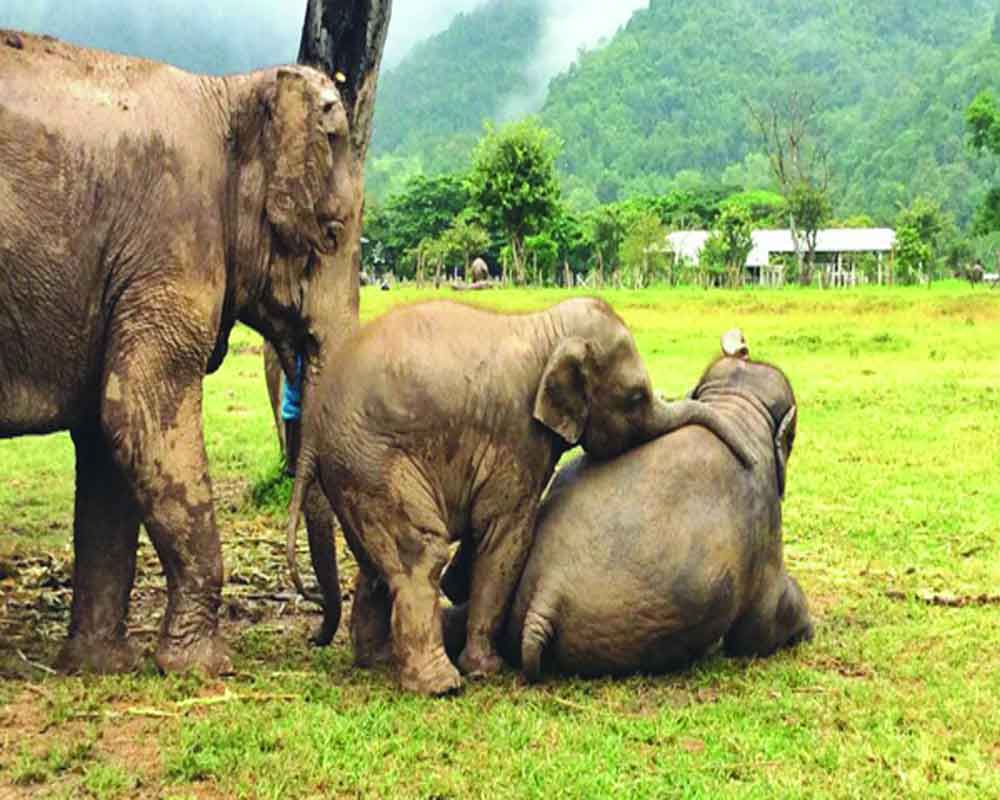Elephants understand everything we say, provided it is put simply. They are in many ways more human than us; yet we treat them shabbily
This happened at the Addo National Elephant Park in South Africa in December 2010. A herd of elephants was out taking the air, and doing some foraging, when a baby elephant became a trifle adventurous. Breaking away on its own, exploring the land around, it slipped and fell into a small depression where it got stuck. Hearing his/her piteous cry, all the mama elephants rushed to the rescue. It was a difficult lift but they managed after a while with powerful pulls and pushes by their trunks. As the exhausted baby lay on its belly with four legs spread out in four directions, the mama elephants gathered all round rebuking him/her just as elderly relatives of a family would collectively berate a young boy or girl whose misguided quest for excitement had led to the jettisoning of discretion and trouble.
The event provided yet another reminder of the immensely strong mutual ties that bind elephants and how humane the latter are. Taking an elephant away from a herd and bringing him/her to a distant place to labour for a human master, causes him/her intense sorrow born of loneliness and haunting memories of old ties that have been severed.
This is particularly so because elephants have long memories that transcend species. They remember acts of kindness and the people behind them. The story of Lawrence Anthony, the Elephant Whisperer, who was a wildlife conservationist, environmentalist and best-selling author, and the herd of seven elephants he took into his reserve, Thula Thula in Zululand, South Africa, is well-known. The damage they had been causing to crops and villages, breaking out again and again from confinement, had enraged people who were determined to kill them. Requested to take them in by the authorities, Lawrence agreed as he knew they would otherwise die. Exceptionally clever behemoths, they posed a major problem for Lawrence.
He adopted the strategy of arriving at the spot whenever they seemed getting ready to break through, and stood before them arguing and pleading with them not to leave, as certain death awaited them outside with groups of hunters and poachers were waiting with guns ready. Gradually, the elephants understood that he was a caring friend, and a deep bond grew between Anthony and them, so much so that a most remarkable thing happened when he died after a heart attack in March 2012. The herd, which now had 29 elephants, was at the other end of the reserve when tragedy struck. Yet, coming to know of the event — it remains unexplained how — they gathered in front of the house and stood silently — almost as if keeping vigil — for two days and then dispersing.
Many more such events can be cited. My grandmother, Punyalata Chakraborty, once narrated a story from the days when under the “Sunset Law”, the Government confiscated and auctioned a land if revenue was not paid before sunset on a specified date. A zamindar, in what was then East Bengal, found on arrival at the treasury that the sack containing the money for revenue payment had disappeared. A thorough search some distance down the road to the treasury drew a blank. He was in trouble; because it was too late to somehow put together the money and bring it over to the treasury. Facing disaster, he stood crying before his beloved elephant, stroking her trunk and saying that he would now have to part with her per force. The elephant listened and, perhaps getting a hang of what it was about, opened her mouth. The sack fell out! Of the various conjectures, the one that became a consensus was that the sack had fallen from her back, on which the zamindar and the mahout sat, somewhere down the road to the treasury. The zamindar did not notice it, but she did and had picked it up and had perhaps thought of carrying it all the way back home and drop it there before she had changed her mind seeing the zamindar’s distress.
Did she understand what the zamindar was saying? One does not know. I was, however, an eyewitness to an incident in a South African game sanctuary some time ago. Travelling in a car, we had run into a herd of elephants that did not recognise the vehicle and were taken by surprise. As they glared suspiciously, the ranger accompanying us, a young woman by the name of Antia, began talking to the matriarch calmly in Africkaans, as if she was explaining a matter to a fellow human being. The matriarch listened intently and led the herd away after Antia had finished.
Curious, I had Antia at the end of the drive as to what she had told the matriarch. She replied, “I just said, Mamma, you know us. We go about the sanctuary every day and never have we caused the slightest harm to you or your babies. So, please go your way. You have nothing to worry about.” Then she added, “Elephants understand everything we say, provided it is put simply. They are in many ways more human than us. And, yet, we treat them so horribly.”
(The author is Consulting Editor, The Pioneer. The views expressed are personal.)


























